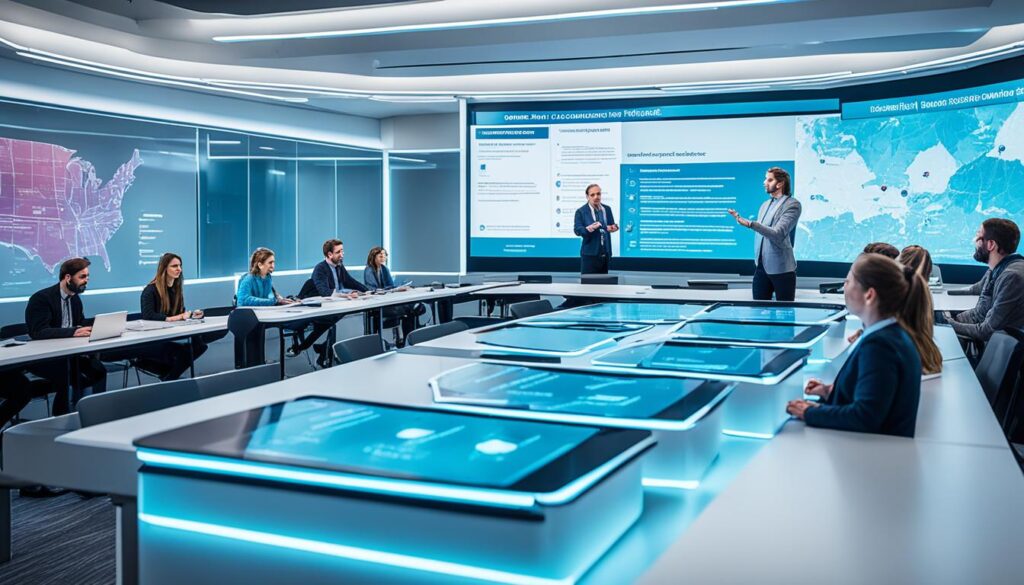New York is at the forefront of redefining legal education, revolutionizing the way law students are prepared for the dynamic and evolving legal landscape. With a focus on innovation, adaptation, and practical skills development, NY is equipping the next generation of lawyers with the tools they need to succeed.
By embracing new approaches and initiatives, NY is shaping the future of legal education. Through transformative curriculum, experiential learning opportunities, and collaboration with industry leaders, the state is ensuring that its law students are well-prepared for the challenges and opportunities that lie ahead.
Key Takeaways:
- NY is taking steps to revolutionize legal education and prepare the next generation of lawyers.
- The state is adopting a transformative curriculum that goes beyond traditional legal subjects.
- Experiential learning opportunities, such as internships and clinics, bridge the gap between theory and practice.
- NY collaborates with industry stakeholders to provide networking opportunities and access to cutting-edge technologies.
- By embracing innovation, NY is shaping the future of legal education and equipping students for a rapidly changing legal landscape.
Transformative Curriculum and Experiential Learning Opportunities
NY is leading the way in legal education with its transformative curriculum that goes beyond traditional legal subjects. By incorporating interdisciplinary studies, NY is equipping students with a broader understanding of the law and encouraging a well-rounded approach to problem-solving. This innovative curriculum aims to prepare aspiring lawyers for the complex and dynamic challenges they may face in their careers.
One of the key pillars of NY’s legal education reform is its emphasis on experiential learning. The curriculum recognizes that legal skills are best developed through practical, hands-on experiences that bridge the gap between theory and practice. By providing students with opportunities for internships, clinics, and simulated courtrooms, NY ensures that they acquire the essential legal skills and gain real-world experience critical for success in the legal field.

Through internships, students have the chance to work in law firms or legal departments, allowing them to witness the day-to-day realities of the legal profession. This exposure enables them to apply their classroom knowledge to real-life situations, enhancing their problem-solving and communication skills.
Clinical programs offer students the opportunity to provide legal assistance to real clients under the supervision of experienced faculty members. By working on actual cases, students gain valuable insights into the practical application of legal principles and develop crucial client management skills.
“Experiential learning allows law students to gain insights into the complexities of the legal profession while building their confidence, critical thinking, and professional skills.” – Sarah Thompson, Dean of Law, NY University
Simulated courtrooms provide a controlled environment where students can practice essential courtroom skills, such as presenting arguments and examining witnesses. These simulations replicate the dynamics of a real courtroom, providing students with a realistic understanding of courtroom procedures and allowing them to develop their advocacy skills.
The combination of a transformative curriculum and experiential learning opportunities positions NY graduates as well-prepared, competent legal professionals who can navigate the complexities of the modern legal landscape.
Key Elements of NY’s Transformative Curriculum
| Element | Description |
|---|---|
| Interdisciplinary Studies | Integration of diverse subjects to foster well-rounded legal professionals |
| Experiential Learning | Practical, hands-on experiences to bridge theory and practice |
| Internships | Opportunities for students to work in law firms and legal departments |
| Clinical Programs | Real-world legal assistance under faculty supervision |
| Simulated Courtrooms | Replication of courtroom dynamics for practice and skill development |
The table displays the key elements of NY’s transformative curriculum, highlighting the incorporation of interdisciplinary studies, experiential learning opportunities, and specific programs designed to enhance legal skills.
Collaboration with Industry and Technology Integration
NY recognizes the importance of collaboration and industry partnerships in preparing law students for the modern legal landscape. By fostering strong relationships with law firms, legal tech companies, and other industry stakeholders, NY Law School is able to offer its students unique opportunities for collaboration and professional development.
This collaboration provides students with valuable networking opportunities, mentorship, and exposure to cutting-edge technologies that are shaping the legal industry. Through industry partnerships, students gain insight into the practical applications of legal theory and have the opportunity to work on real-world projects alongside experienced professionals.
One example of the collaboration between NY Law School and industry leaders is the annual Legal Tech Challenge, where students collaborate with legal tech companies to develop innovative technology solutions for legal challenges. This hands-on experience allows students to apply their legal knowledge in a technology-driven environment and prepares them for the evolving demands of the legal profession.
Moreover, NY Law School’s integration of technology into its curriculum ensures that students are well-equipped to navigate the digital landscape of the legal field. Technology integration initiatives include courses on legal analytics, artificial intelligence in law, and blockchain technology, providing students with the skills necessary to leverage technology effectively in their legal practice.
This emphasis on collaboration and technology integration not only prepares students for the challenges of the modern legal profession but also enhances their marketability. Employers value graduates who possess the ability to work collaboratively, adapt to technological advancements, and understand the intersection of law and technology.

With the increasingly interconnected nature of the legal industry, collaboration with industry partners and technology integration are crucial for NY Law School to ensure that its students are equipped with the skills and knowledge needed to thrive in a rapidly evolving legal landscape.
Embracing the Future of Legal Education
The initiatives undertaken in New York (NY) to redefine legal education demonstrate a profound commitment to preparing the next generation of lawyers for the challenges and opportunities that lie ahead. As the legal landscape continues to evolve, NY is at the forefront, shaping the future of the legal profession.
One key aspect of NY’s approach is the implementation of a transformative curriculum that goes beyond traditional legal subjects. By incorporating interdisciplinary studies, NY aims to develop well-rounded legal professionals who can tackle the complexities of today’s legal challenges. This innovative curriculum equips students with a diverse skill set and allows them to think critically and holistically about legal issues.
In addition to a transformative curriculum, NY embraces experiential learning opportunities to bridge the gap between theory and practice. Through internships, clinics, and simulated courtrooms, students gain practical, hands-on experience in real-world legal scenarios. This experiential learning approach nurtures essential legal skills, such as legal research, analysis, and effective communication, ensuring that graduates are prepared to excel in their careers.
Moreover, NY recognizes the importance of collaboration with industry partners in preparing law students for the modern legal landscape. By partnering with law firms, legal tech companies, and other industry stakeholders, NY provides students with invaluable networking opportunities, mentorship, and exposure to cutting-edge technologies shaping the legal industry. This collaboration ensures that students stay abreast of the latest trends, innovations, and best practices, empowering them to navigate the rapidly changing legal landscape with confidence.
As legal education continues to evolve, NY remains dedicated to equipping its students with the necessary skills and knowledge to thrive in the legal profession. Through transformative curriculum, experiential learning, and collaboration with industry partners, NY is embracing the future of legal education and preparing the next generation of lawyers to make a significant impact in an ever-changing legal world.